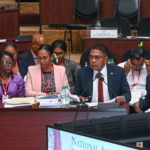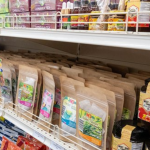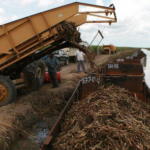The United Nations Development Programme (UNDP) in Guyana, in collaboration with the Food and Agriculture organisation (FAO), is hosting a two- day workshop, focusing on mainstreaming Disaster Risk Management/Disaster Risk Reduction (DRM/DRR) in the local agriculture sector.
A group of extension and field officers representing various stakeholder ministries and agencies are participating in the workshop at the Cara Lodge Suites.
The workshop is aimed at enhancing the capacity of extension officers on climate information while strengthening their capacity on the components of Early Warning Forecasts (EWF), as well as Community-Based Early Warning Systems (CBEWS).
FAO’s representative Reuben Robertson said that the facilitation of this workshop is timely and important since it has been recognised that progress in food and nutrition security, and poverty enhancement has been set back due to the negative effects of climate change on the agricultural sector.
“These negative impacts of climate change result from the fact that our farmers are not yet positioned and equipped with the required information to be able to make evidence- based decisions at the farm level to sustain their livelihood,” Robertson explained.
Robertson added that extension officers will now be better equipped to share information to farmers and other persons in their field of work.
FAO studies have shown that technical support is provided to farmers at the same pace as it was 10 years ago. “Then basically, what we will be doing is just scratching the surface, we will not be able to meaningfully reverse the challenges of climate change,” Robertson stated.
UNDP’s Deputy Resident Representative, Shabnam Mallick also outlined the importance of training extension officers to train farmers. “The training of trainers is based on the findings of baseline needs assessment conducted last year to assess the access and use, as well as level of interpretation of climate information and early warning messages, and an identification of gaps and constraints in the dissemination,” Mallick remarked.
The UNDP Representative further said the extension officers should play a major role in disseminating climate change information. The importance of strengthening collaboration among the key agencies participating in the training exercise is also expected to provide guidance in diverse aspects of climate information dissemination.
Areas of focus throughout the workshop include A Sustainable and Resilient Guyana- disaster risk management, emergency preparedness and response, climate smart agriculture, climate change mitigation and adaptation among others.
Participants are expected to play a vital role in taking information back to the farming community, training farmers to access and use climate information to plan farming activities, and apply early warning systems to secure livelihoods against natural disasters.
The FAO’s Resilient Livelihoods for Food and Nutrition Security Framework Programme 2013 edition states that disasters and food insecurity are directly interconnected. Floods, hurricanes and other hazards can spoil food; destroy agricultural, livestock and fishing and food processing infrastructure, and assets, inputs and production capacity. It can interrupt market access, trade and food supply, reduce income and affect livelihoods.
Moreover, drought, plant pests, animal diseases and food contamination or adulteration have a direct economic impact by reducing or eliminating farm production, by adversely affecting prices, trade, and market access and by decreasing farm income and employment, according to the FAO framework programme.








